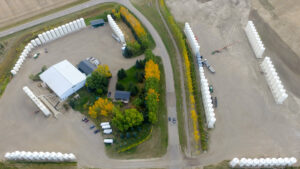2008 is a year I’ll never forget and not only because it was the year our second child was born. It was, of course, the year of the global financial crisis. It was an emotional event for me, because 2008 just happened to be the year I left the banking industry to start a career in seed processing equipment.
Watching the financial collapse was hard — it was the beginning of a challenging time for some of my friends in the banking world. Things went from being all right to no fun at all for a couple of years. It was a big change for them.
Moving into seed processing equipment was a big change for me. At the time, I was fully immersed in learning our industry and getting to know our customers and figuring out how to do this job.
Our company grew. The market for seed processing equipment like colour sorters only continued to grow. There’s a certain amount of insulation between ag and other industry sectors, but what affects one industry affects them all. What led to the 2008 financial crisis was a Wild West mentality that put profit over people. Canada had the benefit of regulations that, thankfully, insulated us from the worst of the banking collapse.
Having 11 years of experience in seed processing equipment, I’ve learned the best course of action for us as a company is the one that makes things right for the customer — even if it’s not the “best” thing for us in the short term. Even if we have to incur a cost now to help the customer, that cost is lower than the damage to our reputation that accumulates over time if you don’t make a serious effort to do the right thing. It is not just about being a “good guy” — it drives opportunities for the future.
People who recognize that they depend on others for their success generally don’t make “looking out for number one” their philosophy. It’s why American banks like Bear Stearns went down and none of Canada’s banks did — remembering that you depend on others for your success changes the way you do business.
The business I’m in is one where people who buy things from you will only do so if they trust you. That trust is almost impossible to gain unless they know you’re going to look out for them and don’t just put yourself first.









